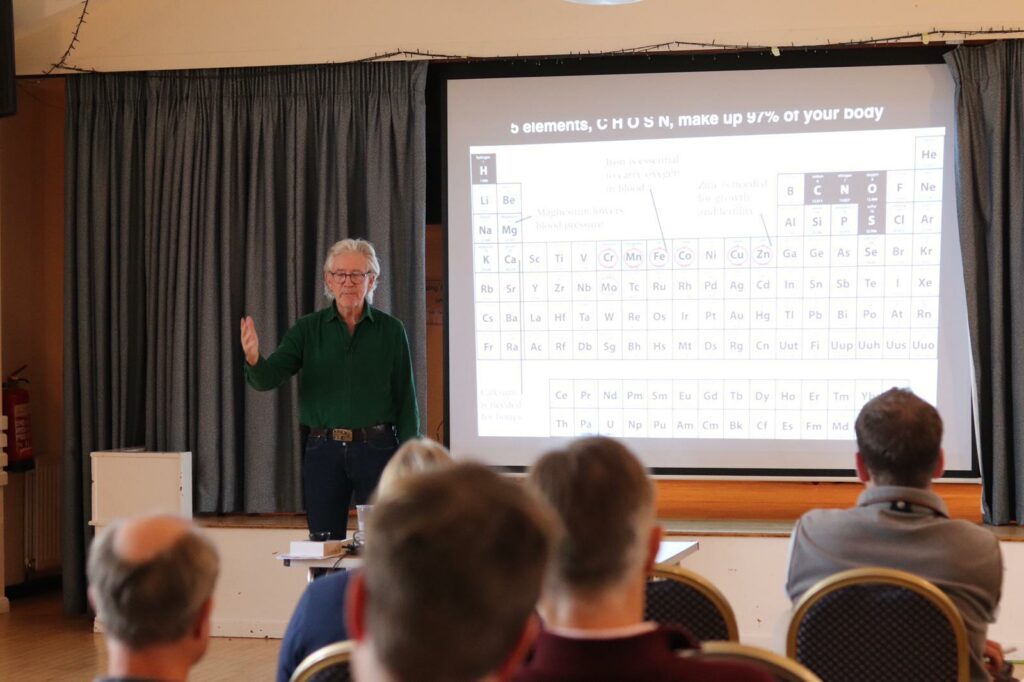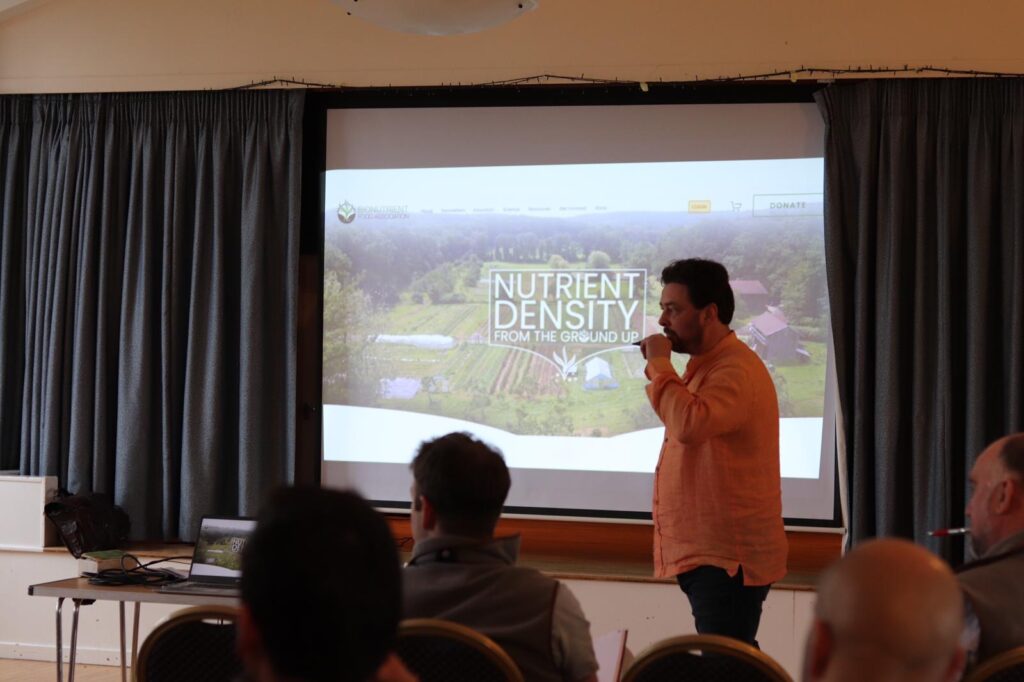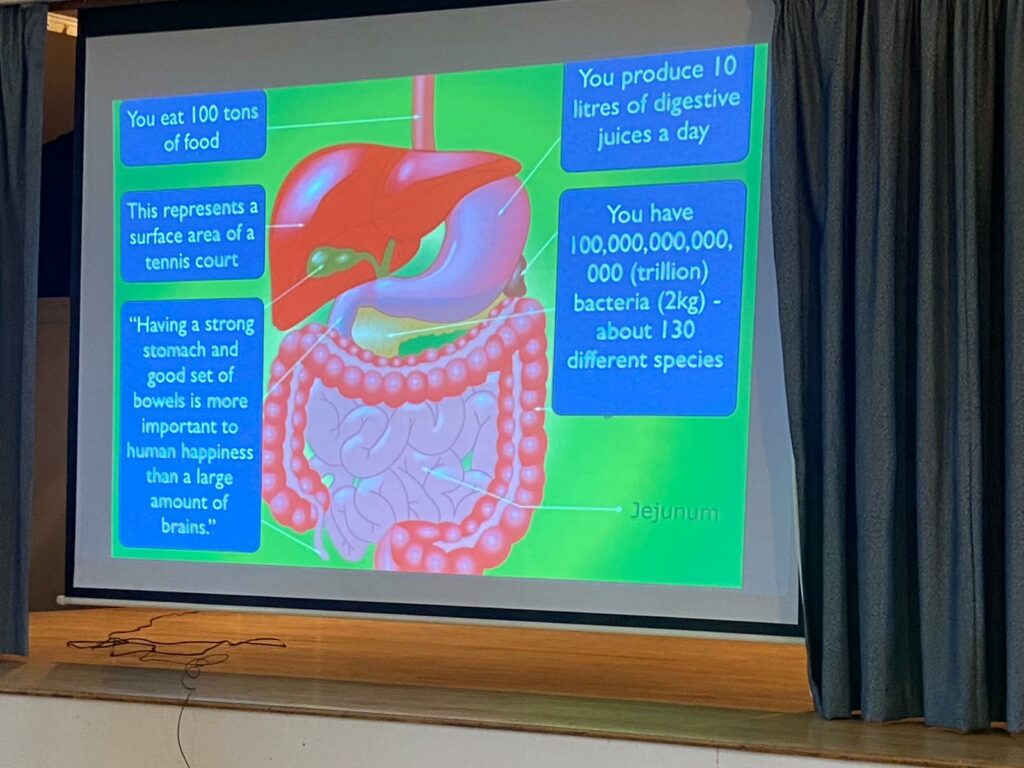February 2024
Water, water everywhere! I bet it turns off just when we need it!
What an Autumn/Winter! The rain keeps coming, which makes you wonder if it will turn off just when we rely on it. On a positive, it is wonderful to see how well my soil copes with these extremes, with fantastic infiltration rates and organic matter levels rising yearly, I can store a lot more water than I used to, which was always one of my aims.
At the time of writing, we have just had yet another storm, which on a positive gives me the time to go and speak at the Scottish Agronomy Technical Conference (there is always a positive, we just have to look for it). To date I have applied some calcium to winter crops, as calcium is the King of nutrients to me and is often overlooked and compared with pH – pH being potential hydrogen. Plants are weak and open to disease when calcium levels are low due to bacterial and fungal attack. It is needed for cell signalling, cell division and cell wall strength. Roots will cease to develop without calcium and if you have a low fungal soil, it can be sign of low calcium, which is why it is so important and why I refer to it as the King of nutrients! Calcium is also the carrier for many other nutrients.
The farm looks very well overall, with lots of potential going forward, but as we all know, things can change so quickly with the weather patterns we are now having to contend with. We have joined the SFI as it brings a nice income onto the farm which is gratefully received. It saddens me to hear many farmers looking at it as just another subsidy and only doing the bare minimum to obtain the cash or looking to put a legume fallow in the Spring, knowing full well it won’t meet the requirements of the scheme. Wherever I speak in the world this scheme is envied by conservation regenerative farmers: the fact that we are being paid to improve the health of our soil, which is any farmers most valuable asset, should be applauded in my opinion. It is quite ironic for me that I always set out to be able to farm without subsidy, when now I am being rewarded for the way I wanted to farm all along. I am not a fan of farmers being encouraged not to farm, as I feel it is such an oxymoron to give ourselves a pat on the back at how green we are being, only to import our food from another country! Robbing their water and resources in order to meet our demand for food, plus the carbon footprint in getting the food here. I have proved that I can still produce food, of better quality than what is imported, I might add! While healing the planet in which we live, putting the carbon back where it should be stored in our soil, to feed the underground livestock. By not producing our own food is just moving the problem elsewhere and we should be hanging our heads in shame at that.

Wood Vinegar will be featuring a lot in my application programme going forward, as it is a fantastic carbon source, which I have seen to improve root growth, leaf etc. Care has to be taken on rates, as it is with all products, balance is everything. What I have seen so far is very encouraging and I will be running more trials this coming season! Trials are always the way forward, as I like actual results and returns before rolling out across the whole farm.
I have had a very busy Winter (Winter used to be a time to replenish my energy levels for the coming year) speaking the length of the UK, which I have thoroughly enjoyed and met some fantastic farmers and people. My website https://www.timpartonfarming.com/ has members from around the globe and is keeping me busy answering questions and helping people on their journey of discovery in the wonderful world of conservation regen agriculture. We all have so much to learn, but farmers have very similar problems wherever they are on the planet.
We have had a very busy few months within the Green Farm Collective, putting together biodiversity/carbon deals and the one where we have been focusing a lot is to be able to sell certified regen produce. This has taken a great deal of work and one which we are very proud of, with our first load of wheat due to leave very shortly, giving at least a £20/ton premium back to our members, be it milling or feed wheat. We are now starting to focus on malting barley as we are having Maltsters getting in touch with us. Demand is escalating, but I would urge everybody to stand together on this one as we deserve a premium for our produce when we are doing so much good for the planet in which we live. I find once you explain the story behind Regenerative Agriculture people want to buy in and be part of that story and will happily pay an extra five pence on a loaf of bread; but the story needs to be told and the produce has to be genuine, otherwise it will get swallowed up and spat out with no premium to the farmer and no achievement for the planet in which we live. It will all just become green washing! This is why we have a set definition within our membership of what Conservation Regenerative Agriculture is and one which will be added to, in order to achieve the ultimate, regenerative planet.

Green Farm Collective have our annual open day on May 22nd which is free to members, and any non-members who want to attend can purchase tickets (see the advertisement within Direct Driller). We have a great line up of speakers and will be updating attendees on our progress with sales of produce, carbon and natural capital.
On a last note, we organised a great workshop with Dan Kittridge from the Bionutrient Food Association and Patrick Holford, founder of the Institute of Optimum Nutrition.
Dan spoke in the morning, talking about his work with the Bio-meter which measures the nutrient richness of the food we have produced. He had some fantastic results with the main theme being that a healthy soil produced the best food, regardless of the system, which all comes back to the microbes within and keeping them well fed: healthy soil is everything. The other interesting results were from beef produced of herbal leys, which produced by far the best meat, compared to cereal fed beef. To me, this is just common sense, as ruminants were never designed to eat cereals, which is why they burp and fart such a lot when being fed a cereal ration. as they have so much indigestion. Whereas a nice herbal ley gives the animal so much choice, that they can get the nutrients they desire in order to keep themselves healthy and at peak production, with that health then being passed onto us. My family and I have been eating grass fed beef for many years now, which I buy from a good friend of mine, Martin Howard from Northcote Farm in Devon, which arrives in perfect condition, frozen, with next day delivery. Nothing beats the taste.

Patrick Holford spoke in the afternoon. He has helped many people including me with mental and physical conditions over the years using nutrition. He spoke on the prevention of Alzheimer’s and dementia, which was a fascinating talk, making the connections with healthy soil, as food should be thy medicine. Like me, Patrick recommends supplementing nutrition with additional supplements, when disease is present, to help the body heal, as sometimes we just cannot eat enough nutrient rich food. This is exactly what I have found within soil, that sometimes the plant cannot get enough of one particular element, which is where sap testing comes in handy, so that I cannot only monitor levels, but also get the plant to the required elemental amounts, in order for me to keep the plant healthy and free from disease, but sometimes high rates are required to achieve the objective.



